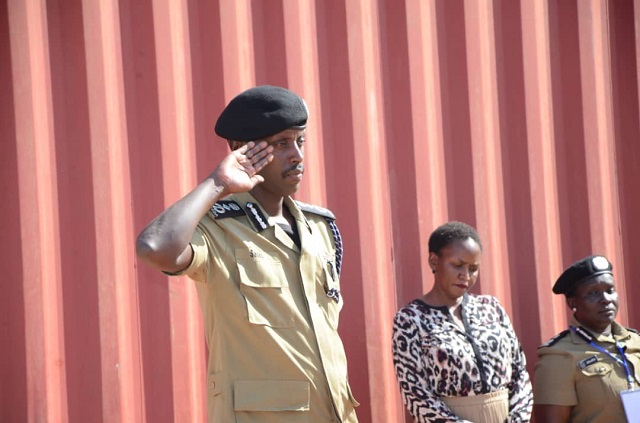
Kampala, Uganda | THE INDEPENDENT | With only 74 days left to complete his three year contract, Maj Gen Stephen Muzeyi Sabiiti was yesterday dropped from his position of Deputy Inspector General of Police by President Yoweri Museveni.
Although the appointing authority was not bound to and did not say why he dropped Sabiiti without deploying him to another position, senior police officers at Naguru police headquarters shared to journalists what his deployment tasks entailed and helped analyse his delivery on them.
Senior police officers have intimated that Sabiiti had been assigned to ensure that aged top police chiefs including those that had scandals in their service records are technically eased out of the force.
Senior officers also added that Sabiiti was to identify young, committed and intelligent people who would replace the ageing Assistant Inspector General of Police -AIGPs and Senior Commissioners of Police -SCPs who were to be exited from the force through non-renewal of their contracts.
If these expectations and perceptions are at least partly true, then one can say Sabiiti has left Naguru a satisfied man as six AIGPs and a number of SCPs have left the police force in less than three years. Six AIGPs is a third of the top police leadership at directors’ level. Many of the AIGPs waited for close to two years for renewal of their contracts but in vain. The AIGPs who by virtue of their ranks and offices sat on police’s Policy Advisory Committee –PAC resigned or were told to step aside.
AIGPs and SCPs who have quit the police force in less than three years include AIGP Fred Yiga who was Director Interpol, AIGP Dr Steven Kasiima who was Director Traffic and Road Safety, AIGP Moses Balimwoyo, who by the time of Sabiiti’s appointment was Director Human Resource, AIGP Grace Turyagumanawe who was Director Peace and Support Mission, and AIGP Lemmy Twinomujuni who was director Parliamentary police.
Also exited was AIGP Godfrey Bangirana whose tenure as director logistics was marred by reports of corruption scandals and was kicked out of office by court order after he had defied IGP Okoth-Ochola and Sabiiti who directed him to leave office.
AIGP Asuman Mugenyi whose last deployment was as Director Police Operations retired. SCP Felix Ndyomugyenyi who was deputy director human resource development, SCP Benjamin Niwamanya who was deputy director human resource management and SCP Dennis Odongpiny who was chairman police court also left.
Gen Sabiiti has left a line-up of young officers at the ranks of Senior Superintendent of Police- SSP, Assistant Commissioner of Police –ACP, CP and SCP, who are set for promotion in order to occupy key police management positions.
“You think it is by coincidence that all those AIGPs left police in only two years?” a senior officer said. “It was a well executed task. Besides, all people who are now deputizing the active AIGPs are young officers. They are being prepared to take over in the near future.”
Of recent, many young police officers have been given key positions at police headquarters. For example, deputy director Legal Services, SCP Christine Nanding, the deputy director human resource is SCP Ann Tusiime, the commandant VIPPU is CP Hadijjah Namutebi, the director ICT is SCP Felix Baryamwisaki and the director forensics is SP Andrew Mubiru. Most of them are in their late 30’s or early 40’s.
Another task police officers believe Sabiiti has delivered is the electronic registration of all police guns. Museveni appointed Ochola and Sabiiti at the time when talk of criminal gangs hobnobbing with police commanders was rife. In fact, some police officers such slain Buyende DPC ASP Muhamad Kirumira and ASP Steven Mugarura wrote dossiers to Museveni accusing their seniors of having links to criminal groups.
“The president tasked Sabiiti to make sure all guns in police, private security organisations and intelligence units are registered,” another senior officer explained. “This was because the President believed that criminals were picking guns from police officers and using them to terrorise citizens. In order to stop that, the task was to ensure all guns are electronically registered and fingerprints of policemen to which these guns are assigned to are captured.”
By the time Uganda went to Covid-19 lockdown earlier this year, a total of 57,171 firearms belonging to the police, prisons, private security organizations, individual civilians and LDUs had been electronically registered.
Police spokesperson Fred Enanga while giving details on electronic gun registration and fingerprinting of owners said the exercise had proved to be effective in reducing incidents of security-involved shootings simply because the ballistic record in the database is easily traceable to an individual or group of individuals, unlike in the past where no ballistic records existed. “Each firearm fired leaves a unique marking on the shell casing, and no two firearms leave the same markings.”
When a bullet is fired, the casing retrieved is entered into an acquisition station, where it acquires different images like a firing pin impression, an ejector mark, a breech face mark. All these marks or impressions are unique, much like the DNA for humans. The images of shell casings are entered into the database, the system searches for matches of shell casings left behind at crime scene(s), allowing forensic ballistic experts to link them up to incidents.
Nevertheless, there were things Sabiiti was yet to achieve. In response to rampant kidnaps, home and factory raids last year, President Museveni tasked Sabiiti to come up with a strategic plan to deal with criminal elements.
Sabiiti then set up five strategic points which were yet to be realised. These include linking with and effective communication with public. In this, he intended to bring police closer to people for every household to feel part and parcel of police work. Quick and effective response to crime incidents where he intended to divide Kampala Metropolitan into policing zones or security constituencies for each station or post, with attendant published call lines, reaction forces and linkage to all stations and posts as well as cameras when there is a distress call.
Police also needed to have registration and marking of streets and residences to enhance quick response, lighting of streets and individual premises or residences where affordable. Swift, effective investigations and prosecution of culprits was another as was profiling and pursuit of known repeat offenders. This is already an ongoing process and the hunt is on.
*****
URN
 The Independent Uganda: You get the Truth we Pay the Price
The Independent Uganda: You get the Truth we Pay the Price




So sad may the Lord advise you in any sector